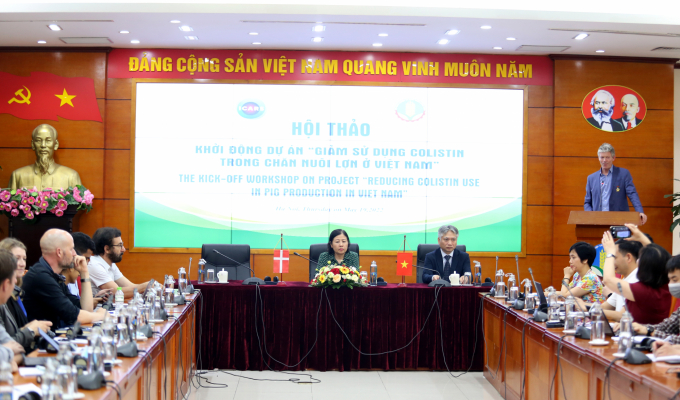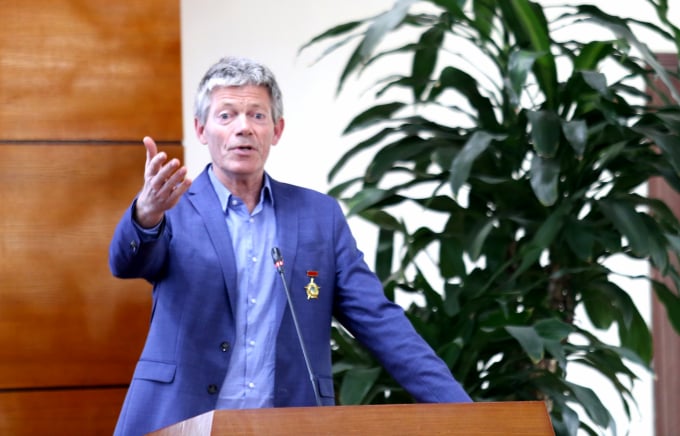November 23, 2025 | 23:43 GMT +7
November 23, 2025 | 23:43 GMT +7
Hotline: 0913.378.918
November 23, 2025 | 23:43 GMT +7
Hotline: 0913.378.918

Kick-off workshop on the project: “reducing colistin use in pig production in Vietnam”. Photo: Minh Phuc.
On May 19, the Ministry of Agriculture and Rural Development (MARD) and the International Centre for Antimicrobial Resistance Solutions (ICARS) of Denmark co-chaired the kick-off workshop on the project: “reducing colistin use in pig production in Vietnam”.
Currently, colistin - the antibiotic medication is frequently used in animal health to treat diseases relating to the gastrointestinal tract of pigs such as enteritis, diarrhea, and intestinal infections such as Ecoli. However, the widespread and uncontrolled use of colistin in livestock production has raised the danger of spreading antibiotic-resistant bacteria and antibiotic residues in foods.
On a worldwide scale, the use of colistin in livestock production should be stopped or at least be considered the last-resort treatment.
Mr. Chu Duc Huy - project coordinator informed that it aims to assist and encourage the development of sustainable pig production by minimizing the usage of colistin and other anti-bacterial agents, consequently reducing the state of antibiotic resistance in the national swine value chain. Besides, the project will help strengthen the management, and formulation of laws and policies aiming to limit the usage of colistin and other anti-bacterial drugs in pig production.
To realize the goal, the project comprises four components including colistin use in pig production; intervention measures to reduce colistin use to control post-weaning diarrhea in piglets; strengthening legal sanctions on reducing colistin use in pig production in Vietnam; capacity building, dissemination, and receiving of research. The project is implemented within 4 years with a total cost of roughly USD 605,000.
The project will focus on piloting solutions in colistin use reduction, contributing to supporting the National Action Plan on prevention and combat antibiotic resistance in agriculture during 2021-2025, as well as examining the execution and administration of policies, and good practices in management and use of colistin.
The project’s result will be integrated with other research on policy impacts, given as evidence, improving legislation, and supporting the review, modification, change, and application of new policies of antibiotic effectiveness in pig production.
Ms. Ngo Thi Kim Cuc - Vice Director-General of the National Institute of Animal Science shared that to implement the project "Intervention projects to reduce the use of colistin to control post-weaning diarrhea in piglets", the Institute will launch three experiments, to test the effectiveness of vaccination use in mother pigs to create antibodies for piglets after birth; using drugs, antibiotics to replace colistin and zinc oxide in the prevention and treatment of diarrhea in piglets.

Prof. Anders Dalsgaard, a high-ranking specialist of ICARS. Photo: Minh Phuc.
Prof. Anders Dalsgaard, a high-ranking specialist of ICARS, and Director of the Project from Denmark mentioned that roughly 50 percent of the antibiotic amount consumed in livestock production via animal feeds. China did ban colistin use some recent years to evaluate the implications of the antibiotic-resistance, the advancement of antibiotic resistance in pigs as well as antibiotic-resistance in the human immune system. Therefore, the animal health sector in Vietnam needs to develop alternative methods for colistin use in veterinary.
Translated by Linh Linh

(VAN) Applying green technology in rural water supply and sanitation helps improve resource efficiency, protect the environment, and enhance community living standards.

(VAN) Developing biosecure livestock production is the key that helps Tuyen Quang form linked chains in livestock production and build its brand in the market.

(VAN) During his bilateral activities in South Africa, Prime Minister Pham Minh Chinh welcomed Vice President of the South African Chamber of Commerce and Industry Neil Pollock.

(VAN) Prof. Dr. Hoang Van Cuong, National Assembly Deputy of the 14th and 15th terms, shares recent pioneering policy decisions.

(VAN) Deputy Minister Tran Thanh Nam directed a comprehensive reform of the agricultural extension system, emphasizing professionalism and connecting farmers with the market.
/2025/11/22/3633-1-072521_760.jpg)
(VAN) The signing ceremony took place under the witness of Prime Minister Pham Minh Chinh and President of the Republic of South Africa Cyril Ramaphosa.

(VAN) Severe flooding in Khanh Hoa Province has caused catastrophic damage estimated at around USD 30 million, with the agriculture and irrigation sectors alone accounting for roughly USD 15.7 million in losses.